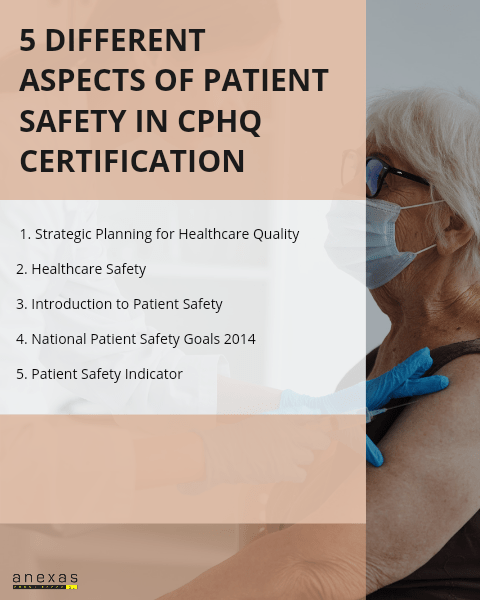Table of Contents
Share This Article
CPHQ Certification- Patient Safety
- 29816 views
CPHQ or Certified Professional of Healthcare Quality is an important certification for Healthcare Professionals as it uplifts the quality standards and optimizes the processes of the organization. But, most importantly it should bring out better services on the patient side. A CPHQ certified professional knows what a patient is expecting from the organization and how to deliver it with his leadership skills, knowledge enhancement and performance management techniques.

One of the most important reasons why an individual or an organization should undergo CPHQ training is the safety of the patients relying upon them. In fact, CPHQ Certification – Patient Safety is one of the most important modules of the training. Since services to patients are the sole purpose of healthcare organizations, the safety of the same should be the most prior responsibility of any healthcare professional. There is a learning curve in everything a professional does and CPHQ training can help a professional to learn many things about Patient Safety.
There are multiple sub-domains which make Patient Safety a domain as a whole. In CPHQ Certification – Patient Safety, you will learn topics like Strategic Planning for Healthcare Quality, Healthcare Safety, Introduction to Patient Safety, National Patient Safety Goals 2014 and Patient Safety Indicator. Each of these topics is explained in this blog, it will help in a better understanding of the aspects.
Let’s see 5 different aspects of in CPHQ certification

1. Strategic Planning for Healthcare Quality
Strategic planning unites pioneers and partners to situate their organization for success in an environment of vulnerability. A healthcare organization works together for strategic planning to reduce costs, improve quality and services, and makes to deliver extensive care to the patients. A strategic planning process also helps in the placement of resources and assets effectively to boost the capability of its services and meet better healthcare needs. Strategic planning contributes, thereby, to raise the bar of standards of healthcare services and quality as a whole. Strategic planning enables organizations to determine their future goals and what actions they will take or need to take to achieve them. The organization needs to analyse the factors which are their strengths and use them to develop the other factors to become their strength too.
2. Healthcare Safety
Healthcare Safety is the safety on the giver side, that is to say, the safety of the healthcare professionals is called healthcare safety. As much as patient safety, quality and services are concerned, the safety of healthcare professionals is also important. It is because, only if the healthcare professionals are safe and sound and are in good health, they will be able to provide their best services. Healthcare safety is about healthcare regulation and information, identification of hazards and controlling of the same and other preventions that can be taken for the safety of healthcare professionals to ensure a safe workplace.
3. Introduction to Patient Safety
Patients are the most prominent reason for needing healthcare organizations. It is the absence of minute harm to the patient that can cause while different operations during the process of healthcare. However, 1 out of 10 patients suffers some or the other kind of harm during treatment or while residing at the organization. This pulls down the quality of the services an organization promises to provide. Although most of the time the error is not caused intentionally, rather those are process flaws, inadequate communication between healthcare workers and patients or lack of responsibility by the patient. Most of the errors occur due to poorly designed processes, which you can learn to rectify and plan better processes in the CPHQ training.
4. National Patient Safety Goals 2014
Because of Healthcare errors, the deaths of people taking services from the healthcare industry are the highest. Hence, the Joint Commission regulated a new set of goals in 2014, and are listed as follows-
- improve the accuracy of patient identification
- improve the effectiveness of communication among caregivers
- improve the safety of using medications
- reduce the harm associated with clinical alarm systems
- reduce the risk of HAIs
- identify safety risks inherent in the hospital’s patient population
- prevent wrong site, wrong procedure.
These goals were highly dedicated to reducing the errors as much as possible and increasing the quality of the services healthcare organizations tend to provide.
5. Patient Safety Indicator
The Patient Safety Indicators (PSIs) are a set of 26 indicators (including 18 provider-level indicators) developed by the Agency for Healthcare Research and Quality (AHRQ) for the provision of knowledge about safety-related adverse events that occur in hospitals during childbirth, operations and procedures. PSI measure drawbacks from these events-
- medical conditions after admission
- surgical procedures
- obstetric procedures
These are solely regulated to make the healthcare professionals aware of the adverse events which are mostly happening because of negligence in the above three areas. However, with the help of these indicators the organization can prevent any of the events that may bring down the quality of their services.
Conclusion
As a whole, we saw how Patient Safety can be a definite need to upscale the quality of any professional or an organization. The training program provided by Anexas will cover every detail of the CPHQ Certification- Patient Safety. You just need to register to become a Certified CPHQ Professional.
CPHQ Certification Training Course
- 28 hrs live training + 2 live projects
- 10+ complementary courses






